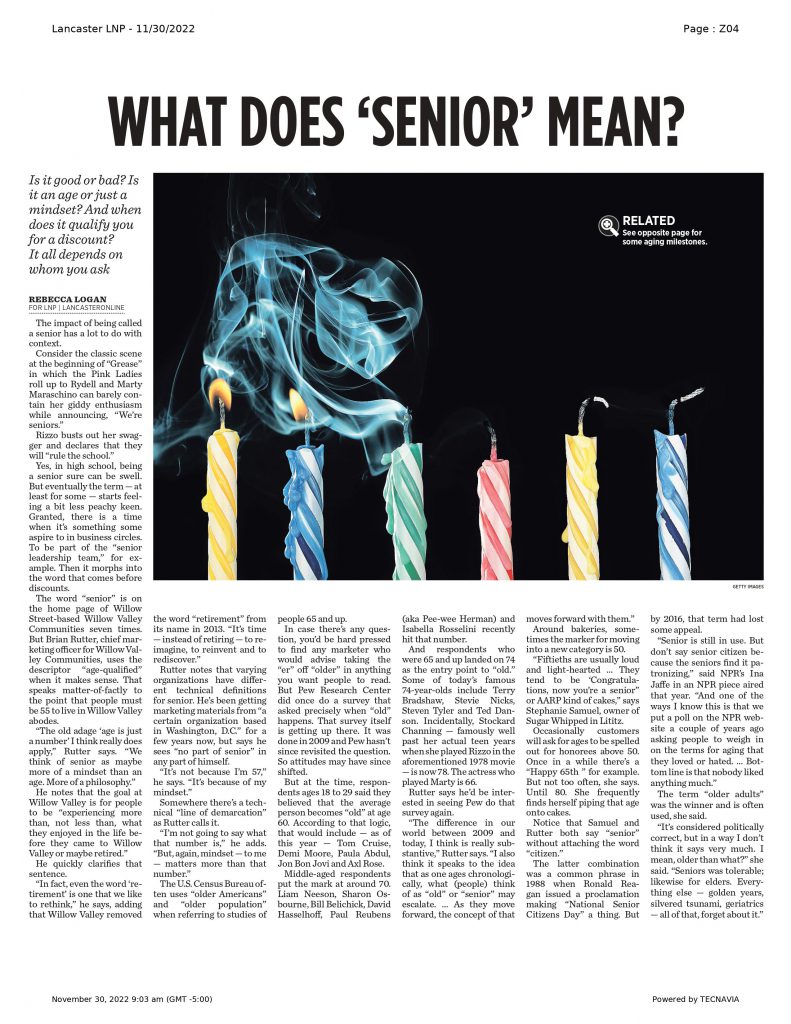Is it good or bad? Is it an age or just a mindset? And when does it qualify you for a discount? It all depends on whom you ask
REBECCA LOGAN FOR LNP | LANCASTERONLINE
The impact of being called a senior has a lot to do with context. Consider the classic scene at the beginning of “Grease” in which the Pink Ladies roll up to Rydell and Marty Maraschino can barely contain her giddy enthusiasm while announcing, “We’re seniors.”
Rizzo busts out her swagger and declares that they will “rule the school.” Yes, in high school, being a senior sure can be swell. But eventually the term — at least for some — starts feeling a bit less peachy keen. Granted, there is a time when it’s something some aspire to in business circles. To be part of the “senior leadership team,” for example. Then it morphs into the word that comes before discounts.
The word “senior” is on the home page of Willow Street-based Willow Valley Communities seven times. But Brian Rutter, chief marketing officer for Willow Valley Communities, uses the descriptor “age-qualified” when it makes sense. That speaks matter-of-factly to the point that people must be 55 to live in Willow Valley abodes.
“The old adage ‘age is just a number’ I think really does apply,” Rutter says. “We think of senior as maybe more of a mindset than an age. More of a philosophy.”
He notes that the goal at Willow Valley is for people to be “experiencing more than, not less than, what they enjoyed in the life before they came to Willow Valley or maybe retired.”
He quickly clarifies that sentence. “In fact, even the word ‘retirement’ is one that we like to rethink,” he says, adding that Willow Valley removed the word “retirement” from its name in 2013. “It’s time — instead of retiring — to reimagine, to reinvent and to rediscover.”

Rutter notes that varying organizations have different technical definitions for senior. He’s been getting marketing materials from “a certain organization based in Washington, D.C.” for a few years now, but says he sees “no part of senior” in any part of himself. “It’s not because I’m 57,” he says. “It’s because of my mindset.” Somewhere there’s a technical “line of demarcation” as Rutter calls it.
“I’m not going to say what that number is,” he adds. “But, again, mindset — to me — matters more than that number.” The U.S. Census Bureau often uses “older Americans” and “older population” when referring to studies of people 65 and up. In case there’s any question, you’d be hard pressed to find any marketer who would advise taking the “er” off “older” in anything you want people to read. But Pew Research Center did once do a survey that asked precisely when “old” happens. That survey itself is getting up there. It was done in 2009 and Pew hasn’t since revisited the question. So attitudes may have since shifted.
But at the time, respondents ages 18 to 29 said they believed that the average person becomes “old” at age 60. According to that logic, that would include — as of this year — Tom Cruise, Demi Moore, Paula Abdul, Jon Bon Jovi and Axl Rose. Middle-aged respondents put the mark at around 70. Liam Neeson, Sharon Osbourne, Bill Belichick, David Hasselhoff, Paul Reubens (aka Pee-wee Herman) and Isabella Rosselini recently hit that number. And respondents who were 65 and up landed on 74 as the entry point to “old.” Some of today’s famous 74-year-olds include Terry Bradshaw, Stevie Nicks, Steven Tyler and Ted Danson. Incidentally, Stockard Channing — famously well past her actual teen years when she played Rizzo in the aforementioned 1978 movie — is now 78. The actress who played Marty is 66.
Rutter says he’d be interested in seeing Pew do that survey again. “The difference in our world between 2009 and today, I think is really substantive,” Rutter says. “I also think it speaks to the idea that as one ages chronologically, what (people) think of as “old” or “senior” may escalate. … As they move forward, the concept of that moves forward with them.”
Around bakeries, sometimes the marker for moving into a new category is 50. “Fiftieths are usually loud and light-hearted … They tend to be ‘Congratulations, now you’re a senior” or AARP kind of cakes,” says Stephanie Samuel, owner of Sugar Whipped in Lititz. Occasionally customers will ask for ages to be spelled out for honorees above 50. Once in a while there’s a “Happy 65th ” for example. But not too often, she says. Until 80. She frequently finds herself piping that age onto cakes.
Notice that Samuel and Rutter both say “senior” without attaching the word “citizen.” The latter combination was a common phrase in 1988 when Ronald Reagan issued a proclamation making “National Senior Citizens Day” a thing. But by 2016, that term had lost some appeal. “Senior is still in use. But don’t say senior citizen because the seniors find it patronizing,” said NPR’s Ina Jaffe in an NPR piece aired that year. “And one of the ways I know this is that we put a poll on the NPR website a couple of years ago asking people to weigh in on the terms for aging that they loved or hated. … Bottom line is that nobody liked anything much.” The term “older adults” was the winner and is often used, she said. “It’s considered politically correct, but in a way I don’t think it says very much. I mean, older than what?” she said. “Seniors was tolerable; likewise for elders. Everything else — golden years, silvered tsunami, geriatrics — all of that, forget about it.”


